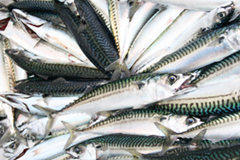The mackerel war has started in Cornwall
Off the coast of Cornwall and Devon the mackerel are in. The big shoals of summer have arrived. Over the next few months these tiger-striped, blue-black-and-green relatives of the tuna will forage northwards, eating anything that will maintain their astonishing energy levels. The generous mackerel will oblige inexperienced anglers, provide a seasonal delight on the barbecue and a solid lump in the bank balance for commercial fishermen in coastal towns the length of Britain. We have learnt to cook — and to revere — the omega-3 laden mackerel since species we used to prefer, such as cod and plaice, were overfished. Smoked mackerel are now as ubiquitous as kippers once were. Hugh Fearnley-Whittingstall’s revisionist textbook, The River Cottage Fish Book, which has led the trend towards cooking with sustainable seafood, has more recipes for mackerel than any other species. Last summer we revelled in his mackerel sashimi, with a dollop of English mustard instead of wasabi. This summer we plan to cook mackerel fillets stuffed with salsa verde. So we return to the west of Scotland and the delights of pulling up mackerel on teams of feathers and spinning for them off the rocks, but with a tinge of regret. For although it may beggar belief that a group of highly sophisticated, ecologically aware nations could dream of threatening one of the last healthy fish stocks we have left, that is what is happening. And we must complain about it — as Struan Stevenson, the Scottish Euro MP, did last week to Maria Damanaki, the European fisheries commissioner. What has happened is that the mackerel’s migration has shifted north and a whole new bunch of people are out to fish them. Forty years ago there were shoals of mackerel in the North Sea. Now in the month of August, when most mackerel get caught, the great shoals are to be found between Norway and Iceland. Last year hard-up Iceland declared a quota of 112,000 tons, having never apparently fished for mackerel before. It cheekily caught this on top of the scientifically agreed quota allocated between the European Union, Norway and Russia, without negotiating a share of the catch. To add insult to injury, Iceland boiled up a lot of the mackerel it caught to make fishmeal. This year it declared a unilateral quota of 130,000 tons and the Faroe Islands say they want more, too. There’s a lot of mackerel out there, of course, about 2.6m tons of it. But you don’t need a degree in applied mathematics to work out that you can’t go on taking 260,000 tons more than the scientifically agreed quota of 571,000 tons for more than a couple of years without killing the fish that lay the golden eggs. Scottish fishermen are deeply concerned. …
